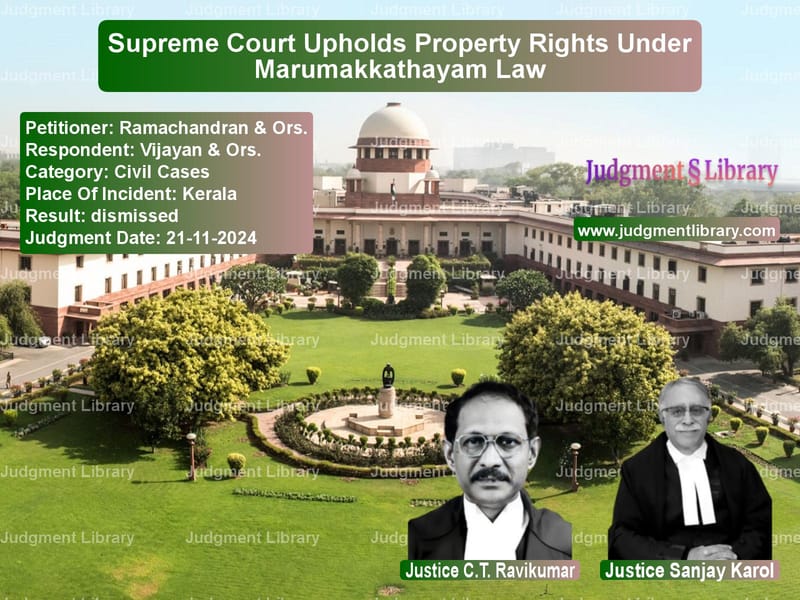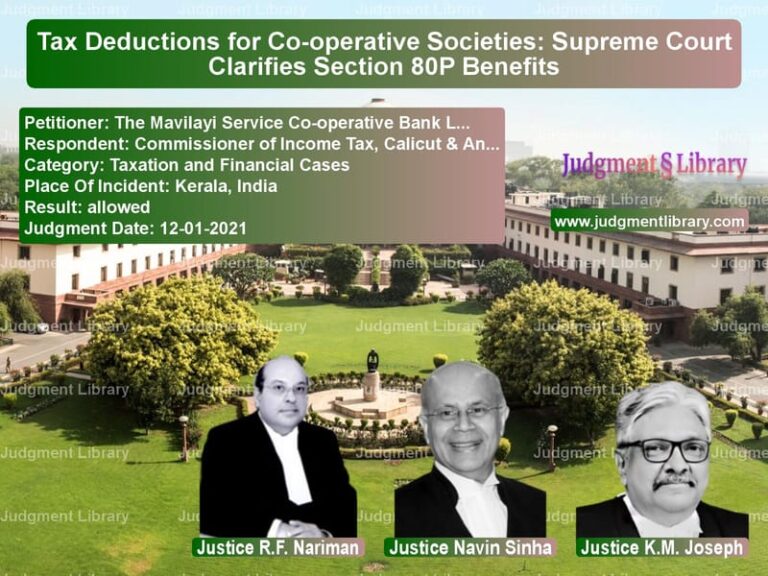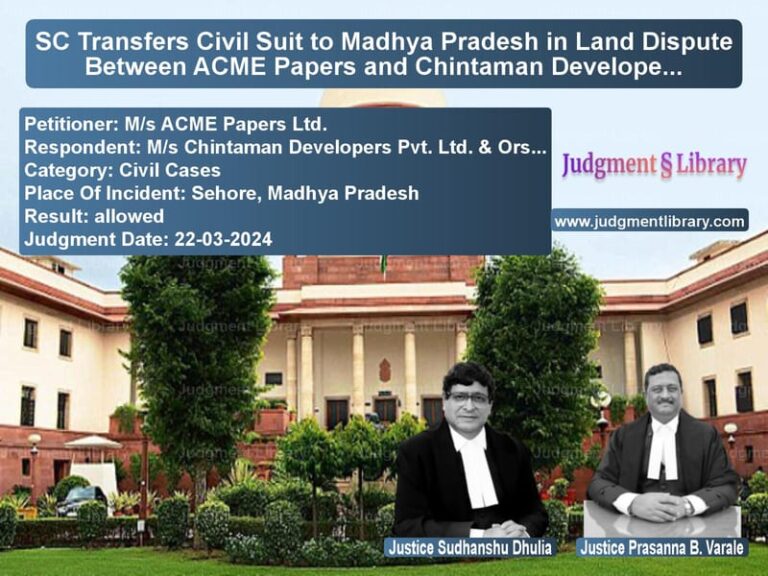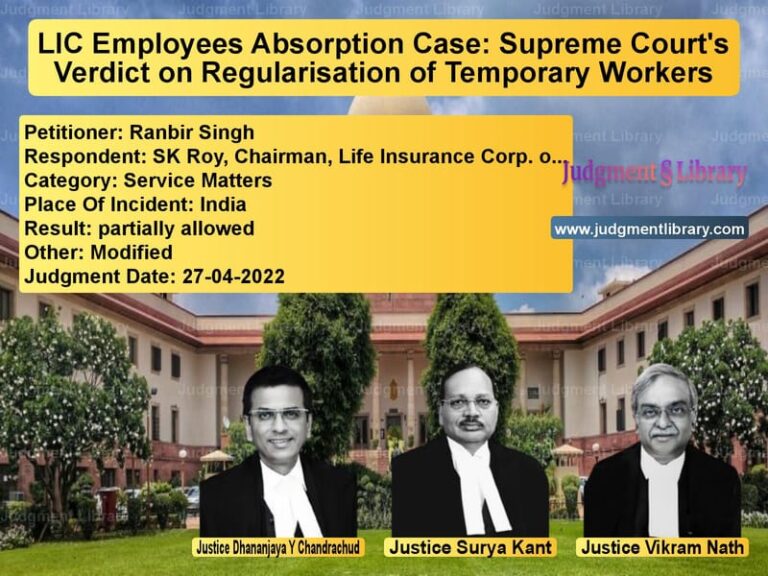Supreme Court Upholds Property Rights Under Marumakkathayam Law
The Supreme Court recently delivered a significant ruling in the case of Ramachandran & Ors. vs. Vijayan & Ors., affirming the application of Marumakkathayam customary law in property disputes. This decision has far-reaching implications for property devolution under matrilineal succession systems.
Background of the Case
The dispute arose over the property inheritance rights within a family governed by Marumakkathayam law. The appellants, who were original defendants in the trial court, contested the preliminary decree passed in favor of the respondents by the High Court of Kerala. The case revolved around the division of ancestral property, particularly the rights of female descendants in the lineage.
Key Legal Issues
- Whether the properties in dispute constituted tharwad (joint family) property under Marumakkathayam law.
- Whether a single female inheritor holds property as her individual asset or as part of a joint family tharwad.
- The application of past legal precedents and customary practices in interpreting matrilineal inheritance.
- The legitimacy of the partition executed among the family members and its binding effect on all descendants.
Arguments by the Appellants
The appellants contended that:
- The properties in question were co-owned by multiple family branches and were not exclusively tharwad properties.
- A female member receiving property in partition holds it as her own, rather than as part of a tharwad.
- The application of Marumakkathayam law should be revisited in light of modern succession laws.
- The earlier partition deed executed in 1950 was binding on all members and could not be reopened.
Arguments by the Respondents
The respondents argued that:
- The properties were inherited following the principles of Marumakkathayam law, which prioritize matrilineal succession.
- The properties were rightly classified as tharwad property, as they were jointly held by female descendants and their children.
- The partition deed executed in 1950 did not override the customary succession rights of the female members.
- The appellants’ claims contradicted well-established legal principles governing matrilineal inheritance.
Supreme Court’s Observations
The Supreme Court analyzed the historical context of Marumakkathayam law and its impact on the inheritance system:
1. Recognition of Marumakkathayam Law
The Court reaffirmed that:
“Marumakkathayam law governs a significant portion of the Hindu community in Kerala and is fundamentally distinct from Mitakshara law, which follows patrilineal succession.”
2. Status of Property Held by a Single Female Heir
The Court clarified that:
“A single female heir inheriting property under Marumakkathayam law does not hold it as her absolute property but as part of the tharwad. Future descendants in the female line also acquire rights by birth.”
3. Effect of Partition on Joint Family Properties
The Court ruled that:
“A partition among family members does not convert joint family property into self-acquired property unless explicitly stated. Tharwad properties retain their character even after division among female members.”
4. Validity of the 1950 Partition Deed
The Court held that:
“The partition deed did not extinguish the tharwad nature of the property, as it was executed among members of a joint family following matrilineal traditions.”
Final Judgment
The Supreme Court upheld the High Court’s decision, affirming the preliminary decree passed by the trial court. The key rulings included:
- The properties in question were confirmed as tharwad properties under Marumakkathayam law.
- The female descendants retained collective ownership over the property.
- The appellants’ claim for individual ownership was rejected.
- The trial court was directed to proceed with the final decree proceedings in accordance with the ruling.
Implications of the Judgment
This ruling reinforces the legal recognition of Marumakkathayam law and strengthens the inheritance rights of female descendants in matrilineal communities. Key takeaways include:
- Preserving Traditional Succession Laws: The judgment upholds the matrilineal property rights framework, ensuring continuity of customary inheritance practices.
- Protection of Joint Family Assets: The ruling prevents individual members from unilaterally converting joint family assets into personal property.
- Legal Precedent for Future Cases: The judgment sets a strong precedent for similar property disputes governed by matrilineal succession laws.
By affirming the principles of Marumakkathayam law, the Supreme Court has provided legal clarity on property rights within matrilineal communities, ensuring that traditional inheritance systems remain safeguarded.
Petitioner Name: Ramachandran & Ors..Respondent Name: Vijayan & Ors..Judgment By: Justice C.T. Ravikumar, Justice Sanjay Karol.Place Of Incident: Kerala.Judgment Date: 21-11-2024.
Don’t miss out on the full details! Download the complete judgment in PDF format below and gain valuable insights instantly!
Download Judgment: ramachandran-&-ors.-vs-vijayan-&-ors.-supreme-court-of-india-judgment-dated-21-11-2024.pdf
Directly Download Judgment: Directly download this Judgment
See all petitions in Property Disputes
See all petitions in Succession and Wills
See all petitions in Landlord-Tenant Disputes
See all petitions in Judgment by C.T. Ravikumar
See all petitions in Judgment by Sanjay Karol
See all petitions in dismissed
See all petitions in supreme court of India judgments November 2024
See all petitions in 2024 judgments
See all posts in Civil Cases Category
See all allowed petitions in Civil Cases Category
See all Dismissed petitions in Civil Cases Category
See all partially allowed petitions in Civil Cases Category







